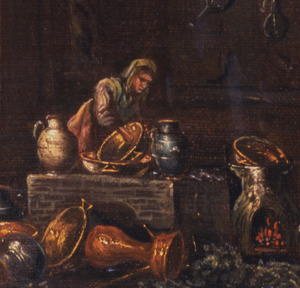Susan Reeve Lyon facts for kids

Susan Reeve Lyon was an important English apothecary who lived in London in the 1600s. An apothecary was like a pharmacist today, someone who prepared and sold medicines. Susan was born in London, but her parents were from the Netherlands. She was married twice, first to William Reeve and later to William Lyon.
Even though there were rules against women and people from other countries working as apothecaries, Susan was allowed to do so. She worked with her first husband and then continued the business after he passed away. When she remarried, the official group for apothecaries even trusted her to teach her new husband how to be an apothecary!
Contents
Becoming an Apothecary in Old London
In London during the 1600s, a group called the Company of Apothecaries controlled who could make and sell medicines. This group was officially started in 1617. To become an apothecary, you had to train for seven years as an apprentice.
The Company of Apothecaries had the power to check any place where medicines were made or sold in London. They would decide if the person was skilled enough. At that time, people from other countries could not join this group. Also, women could not go to university to get formal training. Married women usually could not own property either. However, if an apothecary died, his wife might be able to take over the business. She just had to prove to the Company that she was good at the job.
Susan Reeve's Special Permission
Susan Reeve was born in London, even though her family was Dutch. Her first husband, William Reeve, was from a place called Wesel. Despite these rules, the Company of Apothecaries allowed Susan and William Reeve to work as apothecaries.
In 1617, records show they lived on Aldgate Street in London. By 1618, they were in Limestreet Ward. In 1619, William Reeve was noted for helping a noblewoman, Lady Townshend. After William Reeve died, Susan Reeve was seen as skilled enough to run the business on her own. She was even allowed to train an apprentice, a young man named Thomas Beedham. This showed how much the Company trusted her abilities.
Susan's Second Marriage and Teaching Role
In 1627, Susan Reeve married again, this time to William Lyon. The Company of Apothecaries did not think her new husband was skilled enough to be an apothecary. They even called him "No artist," meaning he wasn't good at the trade.
But Susan was different; they knew she was very skilled. So, in 1629, the leaders of the Company of Apothecaries made a special decision. They allowed Susan to supervise her second husband. Her job was to make sure he learned all the skills needed to become a proper apothecary. This was a big deal, showing her high level of expertise.
Working with Doctors
Susan Reeve Lyon's medicines were bought by doctors like Arnold Boet and Gerard Boate. These doctors would then sell the medicines to their patients. The Boate brothers had studied medicine at the University of Leyden. However, because they were Dutch, the main medical group in London, the College of Physicians of London (CPL), did not approve of them at first. They were considered "irregular practitioners."
Because of this, in 1632, the College of Physicians took action against Susan Reeve Lyon. They prosecuted her for selling medicines to a doctor who was not officially approved by them. However, the College did not say anything bad about the quality of the medicines Susan made. They also did not question her skills as an apothecary. This shows that her medicines were good, even if the College had issues with who she sold them to.
 | Aurelia Browder |
 | Nannie Helen Burroughs |
 | Michelle Alexander |

